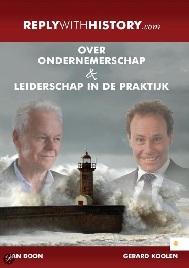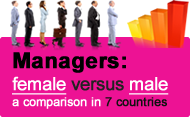54. Inspiration
Dear Jan,
I know very few businessmen in my environment that made their fortune quickly. And those that did often also lost it quickly. I also meet many entrepreneurs starting up businesses with the idea of selling them within a couple of years for a lot of money. It always strikes me that for these people the activity of the company is secondary to the final sale of the company. The focus is only on money. There is no passion for the product or service. There is no thought for the users, the customer, suppliers and employees. (more…)
53. Greed
Dear Gerard,
The fast, flexible, energetic and charismatic leaders you described do indeed have one goal: how to increase the size of their bank accounts as fast as possible. They appear to be fast and flexible, but they and their companies have created a lot of products which only appear to be good for their clients. It is only in the small print that you find the real value of the products. These leaders were dethroned after the widespread crisis of 2008. (more…)
52. About being flexible, fast and solid
Dear Jan,
I recently read a newspaper full of articles about men who had held top positions in large companies who had to step down because they (almost) ruined their company. They were considered to be fast, flexible, energetic and charismatic leaders and “entrepreneurs” showing us the way “proper” business should be done.
51. Entrepreneurs 2.0
Dear Jan,
I largely agree with your analysis of so-called “entrepreneurs”, but I am not positive about the speed of change. This week I read that CEOs of listed companies in the Netherlands are earning more than a year ago, while the unemployment rate is rising. I consider most CEOs to be sham entrepreneurs, i.e. their personal risk of losing money is limited. They do not invest their own money and do not run any additional risk if the company fails. In addition, they often receive (a lot of) money when fired. (more…)
50. Schijnondernemers
Beste Gerard
Dit wordt een optimistische column. Ik zeg het er maar even bij want het begint kritisch.
Aan het eind van de jaren negentig zadelde de 20e eeuw ons op met een nieuwe economische leer: het neo liberalisme. Kort door de bocht komt die leer er op neer dat onze welvaart het meest gebaat is met een volledig vrije markt en een zo klein mogelijke overheid. Dat heeft onder andere geleid tot het loslaten van een groot aantal beperkende maatregelen die waren ingesteld om de financiële sector te reguleren. De resultaten daarvan kennen we inmiddels. Continue reading
49. Alles onder controle
Beste Jan,
Gisteren was ik op een lezing over de financiële toekomst van Europa en Roemenië. Er werd een vergelijking gemaakt met Amerika en waarom Amerika, volgens de spreker, zich sneller herstelt van alle crisis perikelen: banken in Amerika verzorgen 25% van de financiering van het bedrijfsleven en 75% gaat buiten banken om. In Europa is dit precies omgekeerd. Het bedrijfsleven in Europa financiert 75% middels banken. Continue reading









